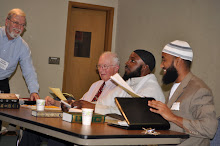By Henry C. Jackson, The Associated Press
Article Last Updated: 07/28/2008 10:51:38 PM PDT
POSTVILLE, Iowa - Scores of Somali immigrants are taking jobs at the nation's largest kosher meatpacking plant, replacing Hispanic workers arrested in a huge immigration raid and forcing a remote Iowa town to make another cultural shift.
Before the May 12 raid at Agriprocessors, hundreds of Mexican and Guatemalan immigrants maintained a vibrant community in Postville, a largely white community of 2,200 people in northeast Iowa.
Now the stoops and haunts once occupied by Hispanics are being filled by about 150 Somali men.
Aydurus Farah, a 21-year-old who emigrated from Somalia in 2004, set out for work in meatpacking plants to make money for his family back home in Somalia.
He planned to begin work at Agriprocessors this week, drawn from Minneapolis to Postville by the promised wages.
"They said over there they pay, like, 13 dollars an hour; very good money," Farah said as he stood outside Sabor Latino, a popular Mexican restaurant.
He said he also appreciates the city's small-town charms.
"I did not like Minneapolis - too many people, too many cars," he said. "I like small towns. I am small-town guy, so this is nice place. Maybe I can raise family here."
The influx of Somalis has been met with some surprise in a community still bewildered by the Agriprocessors raid, the largest action of its kind in the United States. Federal agents arrested 389 people, mostly Guatemalans and Mexicans who had
--------------------------------------------------------------------------------
Advertisement
--------------------------------------------------------------------------------
established roots and become part of the community.
The new immigrants have "raised some eyebrows, which is pretty normal when you get somebody different in town," Postville Mayor Robert Penrod said.
"That said, as far as I know they haven't caused a whole lot of problems. They've been keeping to themselves," he said.
It's not the first cultural change in Postville. The slaughterhouse attracted eastern Europeans in the 1990s, including emigrants from Bosnia, Poland, Russia and former Soviet Republics. Hispanics became the majority in the past decade.
Tuesday, July 29, 2008
After raid, Iowa town deals with Somali immigrants By HENRY C. JACKSON, Associated Press Writer
POSTVILLE, Iowa - Scores of Somali immigrants are taking jobs at the nation's largest kosher meatpacking plant, replacing Hispanic workers arrested in a huge immigration raid and forcing a remote Iowa town to make another cultural shift.
ADVERTISEMENT
Before the May 12 raid at Agriprocessors, hundreds of Mexican and Guatemalan immigrants maintained a vibrant community in Postville, a largely white community of 2,200 people in northeast Iowa.
Now the stoops and haunts once occupied by Hispanics are being filled by about 150 Somali men.
Aydurus Farah, a 21-year-old who immigrated from Somalia in 2004, set out for work in meatpacking plants to make money for his family back home in Somalia.
He planned to begin work at Agriprocessors this week, drawn from Minneapolis to Postville by the promised wages.
"They said over there they pay like 13 dollars an hour, very good money," Farah said as he stood outside Sabor Latino, a popular Mexican restaurant.
He said he also appreciates the city's small-town charms.
"I did not like Minneapolis — too many people, too many cars," he said. "I like small towns. I am small town guy, so this is nice place. Maybe I can raise family here."
The influx of Somalis has been met with some surprise in a community still bewildered by the Agriprocessors raid, the largest raid of its kind in the United States. Federal agents arrested 389 people, mostly Guatemalans and Mexicans who had established roots and become part of the community.
The new immigrants have "raised some eyebrows, which is pretty normal when you get somebody different in town," Postville Mayor Robert Penrod said.
"That said, as far as I know they haven't caused a whole lot of problems. They've been keeping to themselves," he said.
It's not the first cultural change in Postville. The slaughterhouse attracted eastern Europeans in the 1990s, including immigrants from Bosnia, Poland, Russia and former Soviet Republics. Hispanics became the majority in the last decade.
The result is that a town that barely covers two square miles is home to people from 24 nationalities speaking 17 languages.
Farah and others said the Somali community in Minneapolis and elsewhere is abuzz with talk of well-paying meatpacking jobs at Agriprocessors.
That runs counter to stories told by workers at the plant who described pay before the raid as $10 an hour or lower with no extra for overtime. Some also claimed the plant hired underage employees and forced its workers to endure unsafe conditions.
Juda Engelmayer, a spokesman for Agriprocessors, said the company wouldn't comment on pay or staffing issues.
Regardless of previous claims, Hassam Jilmale said he left work at a Tyson plant in Nebraska because he heard he could make more money with better conditions at Agriprocessors.
The 26-year-old said he was starting at the plant on Tuesday.
"We make much more money here," he said. "At the other place, they did not like Somalis. They were no good. So far this is good. It's nice here."
Farah lives with three others in a cramped apartment on Postville's main street — located just above a Latino bakery and Sabor Latino, and down the street from a Hispanic clothing store and a Guatemalan restaurant.
Many of the Somalis who have come to Postville are legal immigrants with roots in Minneapolis, which has one of the nation's largest concentrations of Somali immigrants.
Hassan Mohamud, a Somali native who works as a legal advocate at The Legal Aid Society in Minneapolis, said the young men leave because low-skilled factory jobs are scarce in the Twin Cities and they need to provide for their families.
"It is almost always financial reasons," he said. "Here there are less jobs and the workers cannot cover their financial needs. So they leave so that they can give back ... and they can get a job that doesn't require skills and languages."
No new businesses or mosques have opened in Postville to support the new community, but residents said they are leery about adjusting to another foreign culture even as the outcry over the May raid lingers.
The raid made Postville an unlikely flashpoint in the immigration debate. On Sunday, about 1,000 people, including many Postville residents, marched through the city's streets to protest the immigration raid and Agriprocessors' treatment of employees.
Dave Hartley watched from the street as people marched through the town and past the meatpacking plant. The town's situation is regrettable, he said, and it has thrown many of the residents off balance.
The Mexican and Guatemalan communities "had good and bad ones, but they policed their own," he said.
The new Somali residents seem fine, but he fears there is only so much upheaval the town can take.
"We're just always adjusting and it's scary, it's hard," he said. "We get all these new people and we don't know who they are."
ADVERTISEMENT
Before the May 12 raid at Agriprocessors, hundreds of Mexican and Guatemalan immigrants maintained a vibrant community in Postville, a largely white community of 2,200 people in northeast Iowa.
Now the stoops and haunts once occupied by Hispanics are being filled by about 150 Somali men.
Aydurus Farah, a 21-year-old who immigrated from Somalia in 2004, set out for work in meatpacking plants to make money for his family back home in Somalia.
He planned to begin work at Agriprocessors this week, drawn from Minneapolis to Postville by the promised wages.
"They said over there they pay like 13 dollars an hour, very good money," Farah said as he stood outside Sabor Latino, a popular Mexican restaurant.
He said he also appreciates the city's small-town charms.
"I did not like Minneapolis — too many people, too many cars," he said. "I like small towns. I am small town guy, so this is nice place. Maybe I can raise family here."
The influx of Somalis has been met with some surprise in a community still bewildered by the Agriprocessors raid, the largest raid of its kind in the United States. Federal agents arrested 389 people, mostly Guatemalans and Mexicans who had established roots and become part of the community.
The new immigrants have "raised some eyebrows, which is pretty normal when you get somebody different in town," Postville Mayor Robert Penrod said.
"That said, as far as I know they haven't caused a whole lot of problems. They've been keeping to themselves," he said.
It's not the first cultural change in Postville. The slaughterhouse attracted eastern Europeans in the 1990s, including immigrants from Bosnia, Poland, Russia and former Soviet Republics. Hispanics became the majority in the last decade.
The result is that a town that barely covers two square miles is home to people from 24 nationalities speaking 17 languages.
Farah and others said the Somali community in Minneapolis and elsewhere is abuzz with talk of well-paying meatpacking jobs at Agriprocessors.
That runs counter to stories told by workers at the plant who described pay before the raid as $10 an hour or lower with no extra for overtime. Some also claimed the plant hired underage employees and forced its workers to endure unsafe conditions.
Juda Engelmayer, a spokesman for Agriprocessors, said the company wouldn't comment on pay or staffing issues.
Regardless of previous claims, Hassam Jilmale said he left work at a Tyson plant in Nebraska because he heard he could make more money with better conditions at Agriprocessors.
The 26-year-old said he was starting at the plant on Tuesday.
"We make much more money here," he said. "At the other place, they did not like Somalis. They were no good. So far this is good. It's nice here."
Farah lives with three others in a cramped apartment on Postville's main street — located just above a Latino bakery and Sabor Latino, and down the street from a Hispanic clothing store and a Guatemalan restaurant.
Many of the Somalis who have come to Postville are legal immigrants with roots in Minneapolis, which has one of the nation's largest concentrations of Somali immigrants.
Hassan Mohamud, a Somali native who works as a legal advocate at The Legal Aid Society in Minneapolis, said the young men leave because low-skilled factory jobs are scarce in the Twin Cities and they need to provide for their families.
"It is almost always financial reasons," he said. "Here there are less jobs and the workers cannot cover their financial needs. So they leave so that they can give back ... and they can get a job that doesn't require skills and languages."
No new businesses or mosques have opened in Postville to support the new community, but residents said they are leery about adjusting to another foreign culture even as the outcry over the May raid lingers.
The raid made Postville an unlikely flashpoint in the immigration debate. On Sunday, about 1,000 people, including many Postville residents, marched through the city's streets to protest the immigration raid and Agriprocessors' treatment of employees.
Dave Hartley watched from the street as people marched through the town and past the meatpacking plant. The town's situation is regrettable, he said, and it has thrown many of the residents off balance.
The Mexican and Guatemalan communities "had good and bad ones, but they policed their own," he said.
The new Somali residents seem fine, but he fears there is only so much upheaval the town can take.
"We're just always adjusting and it's scary, it's hard," he said. "We get all these new people and we don't know who they are."
Agriprocessors: We’re immigrants too!
Two days after immigrants and their advocates marched in Postville, Agriprocessors released this statement:
The founders of Agriprocessors, the Rubashkin family, are a Jewish refugee family that escaped the clutches of Communism decades ago. Aron and Rivka Rubashkin fled Soviet Russia after experiencing oppression in the anti religious regime. Mrs. Rubashkin’s uncles were imprisoned in Siberia due to their religious beliefs. Mr. Rubashkin noted: “As immigrants in America we found freedom and opportunity. We fully understand the pain and suffering which immigrants are going through in building better lives.”
Agriprocessors is dedicated to providing economic prosperity, quality jobs and a safe environment for all its employees. Chaim Abrahams, a company spokesman, explained: “We are committed to follow all federal, state and local regulations in our plant.” In reiterating the company policy, Mr. Rubashkin pointed to the hiring of Jim Martin, a former US Attorney in the state of Missouri, as the chief compliance officer of Agriprocessors. “ He is insuring that our company excels in the area of compliance to government regulation” noted Abrahams. Among other things, Mr. Martin established a 24-hour anonymous hotline for any complaints of workers.
Since the plant opened in 1988, it has created a new era of prosperity in the region. The plant has created jobs, and given a boost to the area. Our plant is modern, clean, and consistently focused on food safety and the safety of our workers.
Agriprocessors is deeply concerned about the plight of the immigrant families in Postville. The Rubashkin family feels that it can help others. Aron Rubashkin explained “As an immigrant family we want to provide our workers with the opportunity to share in the American dream. In recent weeks we have been helping the local families with their daily needs”.
The founders of Agriprocessors, the Rubashkin family, are a Jewish refugee family that escaped the clutches of Communism decades ago. Aron and Rivka Rubashkin fled Soviet Russia after experiencing oppression in the anti religious regime. Mrs. Rubashkin’s uncles were imprisoned in Siberia due to their religious beliefs. Mr. Rubashkin noted: “As immigrants in America we found freedom and opportunity. We fully understand the pain and suffering which immigrants are going through in building better lives.”
Agriprocessors is dedicated to providing economic prosperity, quality jobs and a safe environment for all its employees. Chaim Abrahams, a company spokesman, explained: “We are committed to follow all federal, state and local regulations in our plant.” In reiterating the company policy, Mr. Rubashkin pointed to the hiring of Jim Martin, a former US Attorney in the state of Missouri, as the chief compliance officer of Agriprocessors. “ He is insuring that our company excels in the area of compliance to government regulation” noted Abrahams. Among other things, Mr. Martin established a 24-hour anonymous hotline for any complaints of workers.
Since the plant opened in 1988, it has created a new era of prosperity in the region. The plant has created jobs, and given a boost to the area. Our plant is modern, clean, and consistently focused on food safety and the safety of our workers.
Agriprocessors is deeply concerned about the plight of the immigrant families in Postville. The Rubashkin family feels that it can help others. Aron Rubashkin explained “As an immigrant family we want to provide our workers with the opportunity to share in the American dream. In recent weeks we have been helping the local families with their daily needs”.
Subscribe to:
Comments (Atom)

















































